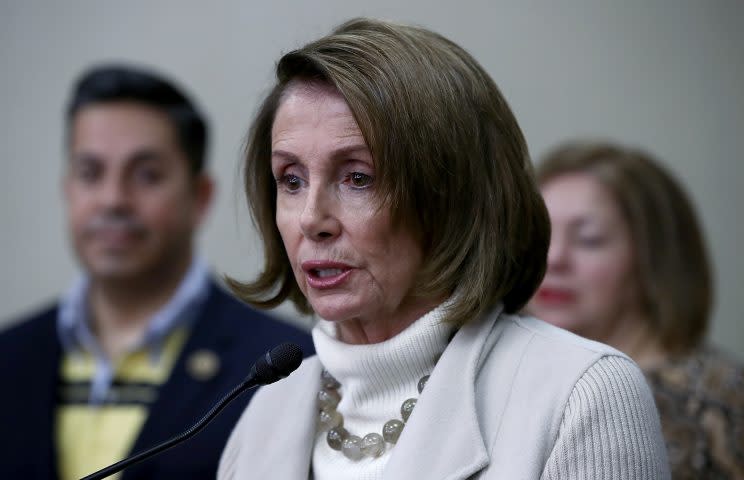Pelosi denies Democrats are divided on strategy for 2018

BALTIMORE — Talking with reporters during a policy retreat for Democratic House members, Minority Leader Nancy Pelosi, D-Calif., tamped down reports of disunity in the party, saying her caucus is united in its plan to win back the House in 2018.
Asked by a reporter why some of her progressive colleagues had reportedly walked out of a meeting hosted by the centrist think tank Third Way at the retreat Wednesday, Pelosi answered, “I didn’t notice that.”
“Members walk out for a variety of reasons, some of them relate to personal hygiene,” she joked.
The reporter pressed on, asking if Pelosi was denying real divisions within her party.
“Yeah, that’s what I’m saying,” Pelosi insisted.
“A political party has to accommodate differences, or else we’d all be teeny-tiny political parties, and we could meet in this room for the rest of our time,” she said, indicating the small hotel meeting room where she was meeting with reporters. She claimed that unlike Republicans, Democrats “don’t have a party orthodoxy.”
But the retreat betrayed signs of discord over the best way forward for the party, which is still reeling from November’s stunning defeat.
Some progressive members think that embracing a Sen. Bernie Sanders-style populism that feeds on the grassroots energy demonstrated in the Women’s March and other protests will lead to victory. Others are looking to appeal to swing voters by learning lessons from members of Congress who were able to hold onto their seats in districts that voted for Trump in November.
Rep. Cheri Bustos of Illinois, who is now co-leading the House Democrats’ messaging and policy operation, is one who survived. She defended her seat in a largely rural northern Illinois district that swung decisively for Trump.
“As Democrats, we can relate to folks who tried Trump,” Bustos told reporters Thursday. “I believe it was people ‘trying Trump’ because they’re concerned about their wages not going up for so long.”
She urged fellow Democrats to reach out to those voters and advised them not to “talk down” to them.
“The message here is that Democrats are authentic,” added Rep. Joe Crowley of New York. “Cheri Bustos is the real deal. She lives in rural Illinois — she understands what makes Americans tick.”
But it’s unclear if messaging to Trump voters will sit well with the Democratic base, which has taken to the streets to protest the new president’s executive order on immigration and to pressure Democratic lawmakers to block his Cabinet and agenda.
Rep. Marcia Fudge of Ohio told reporters she was wary of focusing solely on an “economic message” aimed at voters whom Trump won over in 2016, because, in her view, Trump did not win on an economic message. “What Donald Trump did was address them at a very different level — an emotional level, a racial level, a fear level,” she said. “If all we talk about is the economic message, we’re not going to win.”
Still, nearly all the speakers suggested that while Trump’s unpopularity so far could be a boon to them in 2018, they realize they cannot simply run against the president and expect to win back the House.
“President Trump is a better recruitment tool for us than a central campaign issue,” said Washington Rep. Denny Heck, who is leading recruitment for the Democratic Congressional Campaign Committee (DCCC).
Democrats are zeroing in on 23 seats held by Republicans in districts that voted for Hillary Clinton in November, as well as 10 more Republican seats in districts where she lost by only a few points. Massachusetts Rep. Katherine Clark, who is vice chair of recruitment for the DCCC, said she has spoken to more than 40 potential Democratic candidates, many of them veterans, who want to challenge Republican incumbents in these districts in 2018.
An early test for the grassroots energy in the party will be the four Republican House seats that are being vacated by Trump’s Cabinet picks, including Rep. Tom Price of Georgia. “In Georgia, there’s already an incredible amount of energy beginning to coalesce around the candidate down there,” said Heck, referring to former congressional aide Jon Ossoff.
Read more from Yahoo News:
Trump accuses McCain of emboldening terrorists with raid critique
Syria’s Assad tells Yahoo News some refugees are ‘definitely’ terrorists
Sessions cites permanent rise in crime despite FBI data to contrary



